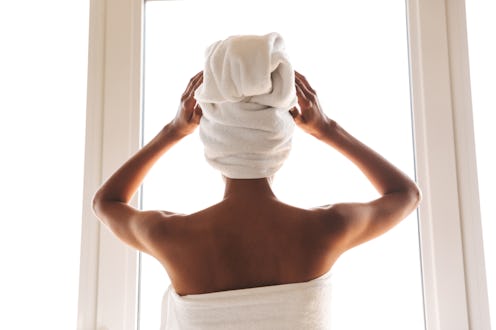Life
6 Surprising Reasons Taking A Lukewarm Shower Is Better For You Than A Hot One

Long, hot showers aren't exactly what they seem. While they may relax your muscles and envelop you in a soothing cloud — and feel particularly nice if you're sick, because the humid steam loosens phlegm — they also carry a host of risks to your skin and heart. Consider instead taking lukewarm showers over hot ones. It may not be as relaxing on the surface as scalding all your troubles away, but it puts your body under a lot less stress. Aside from the obvious reduced dangers of cooler showers — who hasn't accidentally boiled their scalp trying to wash their hair in a too-hot shower? — there are more unexpected benefits that will likely convince you to turn your hot tap down.
It's not entirely clear that hot showers and baths are all bad; a Japanese study, for instance, found that five hot baths a week might reduce your risk of heart disease, but it was a limited study and other factors could have contributed. So if you like a super steamy shower now and then, particularly after a burst of painful physical activity, it's not the worst idea; after all, hot water does relax muscles. However, regularly steaming up the bathroom and raising your heating bill sky-high isn't a good idea for your health. Here are six unexpected reasons to swap your hot shower out for a lukewarm one.
1Heat Dissolves Natural Oils
Your skin has a natural layer of protection that's composed of oils and bacteria. It's called the skin microbiome, and it's important for keeping it healthy and protected — and for minimizing the risk of breakouts and other skin issues. Hot water and those oils do not mix.
Dermatologist Dr. Justine Hextall of the Harley Medical Group told Women's Health, "If you’re heating oils in the skin it’s likely you’re emulsifying, dissolving and literally washing them away. These oils play an important role in protecting your face against external aggressors via the skin barrier." The result is lowered protection and a higher risk of over-production of oil, which isn't good for the skin.
2Too Much Heat Causes Inflammation
The skin, like any other organ, is sensitive to heat and responds to it with inflammation if it becomes over-exposed. "Hot showers and baths can inflame the skin, causing redness, itching, and even peeling — similar to a sunburn," says the University of Pittsburg Medical Center. That causes lasting damage that isn't worth the open pores.
3Hot Showers Also Involve Higher Risk Of Skin Issues
The reduction of the skin's natural oils can cause dryness and sensitivity issues, particularly in cold weather, where wind levels are higher and you're probably regularly inside air-conditioned places with low humidity. "Showering in hot water during the wintery months not only dries out the skin, but also can damage the surface of the skin," says the Baylor College of Medicine. "Extreme dry skin can develop into more serious conditions like skin inflammation and may even increase eczema."
4Skin After A Hot Shower Can Itch
Hot showers also cause an uptick in an element of the body's inflammatory response: its mast cell levels. Mast cells release histamine and cause swelling and itching when, for instance, you get an insect bite. And they can also show up when you overheat in a shower. "The heat can cause mast cells (which contain histamine) to release their contents in the skin and cause itching," Dr. Adam Friedman told Heathline. Hence any strange itching issues after a prolonged steamy shower.
5Excess Exposure To Heat Is Dangerous For People With Blood Pressure Issues
Overheated bodies use the circulation system to cool down, increasing blood pressure and flushing your skin with cooler blood. "Normally, these events don’t cause problems. However, if you have existing cardiovascular disease, the cascade of events could overtax your heart," notes the Cleveland Clinic. This is why people who have precious heart issues or cardio problems in their families aren't advised to spend too much time in seriously hot environments, like saunas or, you guessed it, hot showers.
6Colder Temperatures Boost Circulation
Cooling down isn't just a method of avoiding the risk of hot water; it also carries benefits of its own. Going lukewarm, dermatologist Jessica Cheung told Health Magazine, "will initially help constrict blood vessels in your skin to temporarily tighten pores and decrease redness and puffiness," and adds that "cold temperatures boost circulation (it’s your body’s way of keeping warm). For your face, that might mean a healthy glow."
You don't have to dip into a freezing shower every morning to avoid potential health issues. However, having the temperature cranked all the way up is likely contributing to health woes in ways you hadn't anticipated. Instead, try a lukewarm shower — warm enough to soothe your tired soul, but not hot enough to cause too many issues.